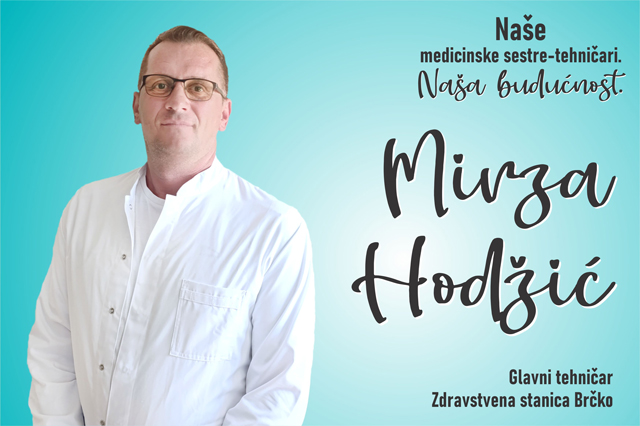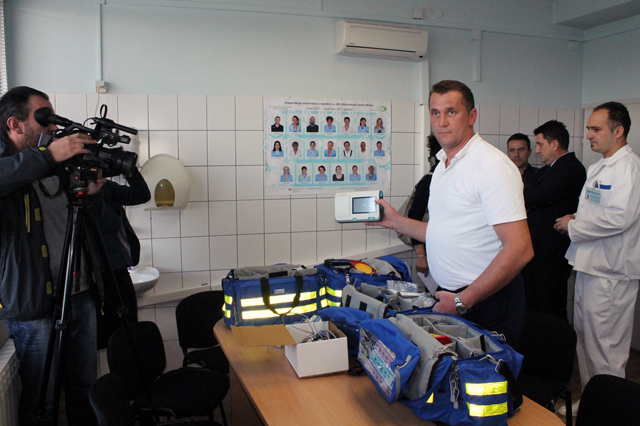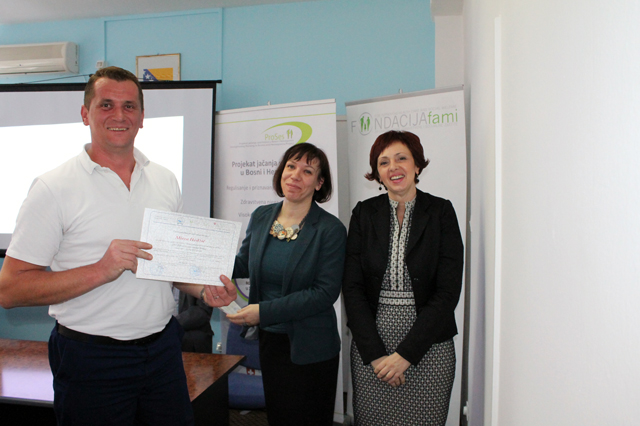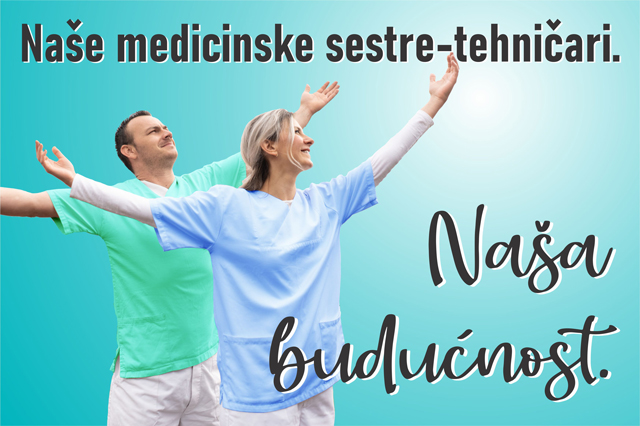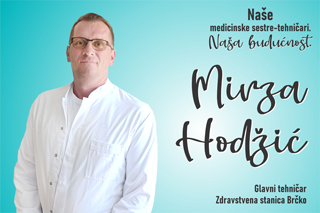
Mirza Hodzic is the head nurse at the Healthcare Centre Brcko. His career started in 1993 when he was 18. He finished secondary medical shool in Tuzla.
Choosing the nursing profession... The decision to engage in this profession is generally not made by a young person on their own. Of course, there must be love for this job, but there are also recommendations and advice from parents. Most of my colleagues entered medical school with intention to continue studies. That was my vision as well, to finish high school and enrol in college, which I did, but because of the war events I had to leave college in my second year.
Experience and education... From the beginning of my work experience until 2013, I worked in the emergency department. I completed my education as "advanced emergency nurse" in the Institute for Emergency Medical Assistance of Sarajevo Canton in 2004. From 2013 to February 2021, I worked in the community nursing service of the Brcko Healthcare Centre. Within the Strengthening Nursing in Bosnia and Herzegovina Project, I was selected for mentor-educator, and I trained 40 colleagues from Tuzla, Bihac, Gracanica and Orasje. I shared my experience and observations at the panel discussion organized at the final conference of the second phase of the Project.
Working with patients... Being a nurse in Bosnia and Herzegovina is much more difficult compared to the same job in the European Union. The reason for this is much smaller number of professionally-educated nurses compared to the number of patients, but also the lack of information technology. The health condition of the population after the war is largely different compared to other countries, especially in terms of mental health. An increasing number of people consume sedatives and antipsychotics, and a nurse without empathy and love for this job can hardly reach the patient, which is essentially the goal of our profession - for the patient to open his/her soul to us.
Problems and shortcomings in the Healthcare Centre Brcko... It is very difficult to look for flaws in the institution where you have spent 30 years, but I will list some that I believe are easily solvable, and if they were eliminated, the work in the institution would improve to a considerable extent. The first drawback is the failure to introduce an information system (e-booklet, e-patient file and e-recipe). The introduction of these systems would free up a large number of nurses, who would be more involved in working with patients. Very little is done on health promotion and disease prevention. The equipment and space are outdated, and I believe that modernizing the equipment and space would solve a major problem in the institution. Education of nurses is a very important issue for the development of the profession, and I am of the opinion that all health professionals must keep up with the times and follow the development of new technology. Visiting medical equipment fairs, as well as participating in seminars and congresses in the country and the surrounding area, is very important.
The position of nurses in BIH... The interference of external factors in the health system at the state level has led to the fact that we have a shaken system, which cannot respond to the tasks for which it exists. Recently, we have witnessed the suffering of oncology patients. All these shortcomings lead to patient dissatisfaction, which weakens the position of nurses in the society. They are often criticized by the public as the main culprits for the malfunctioning of the system. We are exposed to stress every day, which has been deposited in us for years and often manifests itself in our private lives. Humanity and empathy are qualities that should adorn a nurse, and this should be strived for by properly selecting students who enrol in medical school and properly selecting candidates who are hired for a certain position. Only in this way the position of nurses would be raised to a higher level.
Good and less good things about the nursing profession... The good sides of this profession are the love for people and the desire to help others. This is not just a job, this is a big responsibility and a big burden on the back. By choosing this profession, one should be aware that one has to be the closest family member to thousands of patients who will ask for help. In doing so, one must be very careful not to invade the patient's privacy, and on the other hand, to get to the heart of the problem and win the patient's trust in the best possible way. The greatest satisfaction is when you bring a smile and joy to a person who has lost hope and faith in life and people. Along with all the good sides, this profession also has bad sides. The biggest disadvantage of this profession is that work-related issues cannot be left at the workplace. Each nurse finds herself/himself in a situation several times a day, where she/he has to deliver news that is emotionally difficult for the family and the patient to bear. Most of these difficult situations are carried home, leading to emotional exhaustion and affecting the quality of life. Many times nurses work in an unsafe environment, exposed to various dangers, without working hours and adequate pay.
Relationship with patients and doctors... The nurse-patient relationship is a very important element for the treatment and achievement of the ultimate goal, which is healing. Nurses invest in themselves, their skills, knowledge, communication and empathy in order to achieve the desired effect. The nurse should accept and understand the patient and encourage her/him to talk. In this relationship, the nurse observes the patient, monitors the patient's behaviour and movements during the conversation, in order to ensure trust. The primary task of the nurse is to establish communication with the patient.
The nurse and the doctor are the closest collaborators. An educated nurse who knows standard operating procedures, along with good communication, is an excellent assistant to any doctor. Communication in the team should be two-way and constructive, the nurse being actively involved in the work.
Departure of health professionals from BIH... The departure of nurses has become a modern trend in the last couple of years. I am not sure that the reasons for the departure are of a financial nature, as there are a lot of other factors that are present. In conversations with most of the colleagues who left, I got the answer that they were leaving the country because of the uncertain political situation. In the countries where they decide to work, the working environment is safer, personal income is higher, working hours are flexible, and norms are clearly set. The problem in Europe is certainly the aging of health professionals, so they are forced to import labour. I think we are too late to prevent or reduce the departure of staff and regardless of income, employed nurses aged 25-40 with work experience are still leaving. I believe that the priority is to keep a quality staff, with regular education and scholarships at higher educational institutions. The task of the state and local communities is to take care of this problem, because we will see the consequences only in the coming period.
Work during the COVID-19 pandemic... Facing something invisible and new is not exactly an experience I will remember fondly. My job was to make home visits to regular patients, as well as to patients with suspected COVID-19 in their home settings, under the prescribed protection measures. During the pandemic, a separate unit was formed in a very short time, which received patients with symptoms of COVID-19, and family doctors and nurses worked in that clinic. In a short time, many nurses were hired, for whom it was their first job. I must emphasize that many of them have proven themselves and have grown into good nurses. I can say that it was a bad period in the life of all of us and a reminder that health professionals can never sleep peacefully.
Additional training and education... Additional training is very important for health professionals in our country. From personal experience, I can say that training helped me a lot by advancing my self-confidence, as you realize how good you are in your profession and where you are in relation to the environment. A lot of attention should be paid to the training of staff in the field of communication in healthcare. For me personally, this education helped a lot to get rid of pressure and nervousness during lectures at congresses and seminars as well as public appearances in the media. Continuous internal education at the level of the institution is the obligation of all employees of the institution.
About the contribution of the Fami Foundation to the nursing profession... The significance of the Fami Foundation for the health professions in BIH is of great importance, primarily because they brought us closer to the standards of work in EU countries, by focusing on the work of community nurses and the engagement of other institutions in the local community. The Fami Foundation has donated equipment to several healthcare centres that is essential and useful for the work of community nurses. The development of standard operating procedures for hospitals and primary healthcare centres was also very important. Competent persons took part in the preparation of the procedures that are applicable in the entire territory of Bosnia and Herzegovina. I would highlight and emphasize the importance of the mentoring visits of colleagues from Switzerland, from whom we learned very important things regarding the care of the most difficult patients at the end of life. Fami organized numerous trainings attended by colleagues from all over the country, focused on subject matters constructive and important for my profession.
A situation or event that will not be forgotten in the career... There are many events that I remember in my career so far. Unfortunately, there are a lot of sad ones, but a detail from the mentoring visits at Bihac Primary Healthcare Centre stayed in my memory. With a colleague, I visited a patient who had hypertension and was asthmatic, but he was not taking therapy. The values were very high and of course I found the drugs he had, but wasn't taking. That day he was much better and for a certain period, the patient contacted a colleague to call me to come to him again from Brcko and visit him. By the way, I must emphasize that during my visits to the Bihac Primary Healthcare Centre, I gained enormous trust from the patients, which was a great honor for me. I also gained many friendships with colleagues whom I mentored. Certainly, there were more of those moments, but unfortunately there are also many sad moments that people don't even like to remember, but remain burned deep in the memory, primarily during the pandemic, when we lost many colleagues, friends and acquaintances. Never again!.
A message to future generations... The message to young people is the following - if you have already entered medical school, you must be aware that you will have a lot of sacrifices in life. Love people, be humane and talk to patients, because for most of these patients, talking is therapy. A young nurse must first go through the departments that, in my opinion, are the basis for a good nurse, and that is the emergency medical department, where you will learn how to react in stressful situations and only after a few years to profile yourself further in the profession. Don't let your first job be at a counter in a specialist service. Attend as many educations, congresses and seminars as possible, where you will make great friends and exchange experiences and in that way have a colleague in every institution that you can turn to for help in case of emergency.
